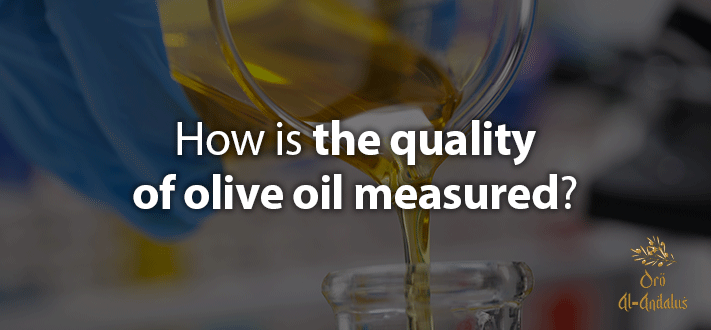Olive oil is a liquid treasure with a rich history and a variety of flavors and aromas that make it unique. But how is the quality of olive oil measured?
The quality of olive oil is evaluated based on several factors, and here we will explain the main methods used to determine if you are dealing with high-quality Extra Virgin Olive Oil (EVOO).
1. Olive Oil Tasting:
Tasting is a sensory process carried out by trained tasters who evaluate olive oil using their senses.
During the tasting, the aroma, taste, texture, and balance of the oil are assessed. Tasters look for positive characteristics such as fruity, bitter, and peppery notes, while also identifying potential defects like rancidity or vinegar-like flavors.
Olive oils are rated on a scoring scale and categorized as “Extra Virgin,” “Virgin,” or “Lampante” based on their characteristics and defects.

2. Chemical Analysis:
Chemical analysis is a crucial part of assessing the quality of olive oil.
Laboratory tests are conducted to measure parameters such as acidity, peroxides, UV absorption, and other indicators that indicate the oil’s quality and degree of oxidation.
Low acidity levels are an important indicator of high-quality extra virgin olive oil.
3. Origin and Provenance:
The place of origin and provenance of olive oil are critical factors in determining its quality.
Olive oils with Protected Designation of Origin (PDO) or Protected Geographical Indication (PGI) status are often considered high quality due to strict regulations governing their production in specific areas.
4. Extraction Methods:
The extraction methods used can also influence the quality of the oil.
Premium extra virgin olive oils are primarily obtained through mechanical cold-pressing, meaning that olives are pressed or centrifuged to extract the oil without the use of heat or chemicals.
5. Expiration Date and Packaging:
The expiration date on the olive oil label is an important reference for its quality and freshness.
Dark and airtight packaging protects the oil from light and oxygen, helping to maintain its quality over time.

6. Certifications and Quality Seals:
Look for quality seals and certifications on labels, such as the International Olive Council (IOC) seal or quality seals from producing countries. These seals often guarantee the authenticity and quality of the oil.

When looking for high-quality olive oil, pay attention to these factors and verify the information on the label. Choosing premium EVOO ensures not only exceptional flavor but also the health benefits associated with quality olive oil.
The next time you enjoy our exquisite EVOO, you’ll know that you’re savoring a product that has been carefully evaluated and measured to meet the highest quality standards. Health and flavor!
Our Oro Al-Andalus Olive Oil is a Spanish oil with a unique flavor and aroma. Born in the Serranía de Ronda, Andalusia, it features fruity notes and a perfect balance between bitterness and spiciness, guaranteeing you a unique experience.
If you want to learn more, contact us at +34 690 613 790 or visit our website. You can also follow us on our social media channels to stay updated. We’re on Instagram and Facebook. See you soon!

